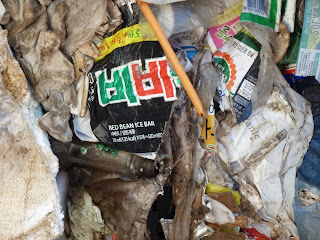Groups Vow to Keep Pressure on PH and Canadian Governments on Second Anniversary of Illegal Garbage Shipments
Environmental
groups today vowed to step up the pressure to both the governments of Canada
and the Philippines to fairly and speedily solve the problem with the illegal
garbage shipments from Canada, now totalling 98, that are languishing in Manila
and Subic ports.
The EcoWaste Coalition and the Green Convergence for Safe Food, Healthy
Environment and Sustainable Economy (Green Convergence) issued the statement coinciding
with the second anniversary of the arrival of the first batch of Canadian garbage
consignments on June 23, 2013
“We need to muster extra vigilance to compel Canada to take back their garbage and
bring this scandalous smuggling of trash masquerading as ‘recycling’ to a
close,” said Aileen Lucero, Coordinator, EcoWaste Coalition.
“Traders of recyclables
must ensure that only clean and properly segregated materials are sent here for
non-toxic recycling, and not for disposal in landfills or other facilities. The Philippines is no disposal site for
global garbage,” she said.
For her part, Dr. Angelina Galang, President of Green Convergence, said: “Para
sa daang matuwid, kailangang tuwirin ang ating kapaligiran. Ang
paglason sa tubig, hangin at lupa ng basura mula sa Canada ay kailangang
tutulan ng ating gobyerno at pilitin ang gobyerno na maibalik ito sa kanilang
bansa.”
Lucero expressed concern that dirty shipments that could not enter China due to
their enforcement of more stringent regulations in 2013 might be being diverted
to the Philippines. “We should recognize
this threat and act decisively to stop it,” she said.
To address the problem with the trade of low-quality imports that are
supposedly used by the domestic recycling industry, the EcoWaste Coalition
urged the government and the industry to step up the collection of
locally-generated plastic wastes that are available in large quantities for
clean recycling.
It also asked the government to study and, if suitable, replicate China’s
“Green Fence” policy adopted in 2013, which, to some extent, prevented dirty
and poorly sorted “recyclable” waste
materials from entering the country, forcing companies to comply with the waste
quality requirements and upgrade their operations to control environmental
pollution.
In 2013, 50 container vans of heterogenous garbage materials, mostly residual
plastics that can no longer be recycled, reached Manila in six batches with the
first batch arriving on June 23 and the last batch on August 21.
The Bureau of Customs (BOC), in coordination with the Environmental Management
Bureau (EMB), has since impounded the illegal shipments, filing a smuggling
complaint against Chronic Plastics, Inc., the consignee based in Valenzuela
City, for breach of the Tariff and Customs Code and R.A. 6969, the Toxic
Substances and Hazardous and Nuclear Wastes Control Act.
As the problem heats up with Canada’s unbending refusal to take back their
garbage despite appeals from legislative, church, labor and civil society
leaders, as well as from over 25,000 Canadian and Filipino citizens, the BOC
uncovered yet another dubious shipments of plastic scraps.
The BOC reported that 48 unclaimed container vans of plastic scraps from Canada,
consigned to Live Green Enterprise based in San Fernando City, Pampanga, entered
the country in four batches in December 2013 to January 2014.
Subsequent waste analysis and characterization study conducted by the EMB last
Friday showed that the latest garbage shipments of 48 container vans were
“basically the same” as the previous 50 container vans, consisting of heterogenous
plastic materials and other wastes.
Information sources re China’s “Green Defence:”
http://www.recyclinginternational.com/recycling-topics/topics/operation-green-fence





Comments